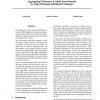Free Online Productivity Tools
i2Speak
i2Symbol
i2OCR
iTex2Img
iWeb2Print
iWeb2Shot
i2Type
iPdf2Split
iPdf2Merge
i2Bopomofo
i2Arabic
i2Style
i2Image
i2PDF
iLatex2Rtf
Sci2ools
106
Voted
ATAL
2010
Springer
2010
Springer
Aggregating preferences in multi-issue domains by using maximum likelihood estimators
In this paper, we study a maximum likelihood estimation (MLE) approach to preference aggregation and voting when the set of alternatives has a multi-issue structure, and the voters' preferences are represented by CP-nets. We first consider multi-issue domains in which each issue is binary; for these, we propose a general family of distance-based noise models, of which give an axiomatic characterization. We then propose a more specific family of natural distance-based noise models that are parameterized by a threshold. We show that computing the winner for the corresponding MLE voting rule is NP-hard when the threshold is 1, but can be done in polynomial time when the threshold is equal to the number of issues. Next, we consider general multi-issue domains, and study whether and how issue-by-issue voting rules and sequential voting rules can be represented by MLEs. We first show that issue-byissue voting rules in which each local rule is itself an MLE (resp. a ranking scoring rule...
| Added | 08 Nov 2010 |
| Updated | 08 Nov 2010 |
| Type | Conference |
| Year | 2010 |
| Where | ATAL |
| Authors | Lirong Xia, Vincent Conitzer, Jérôme Lang |
Comments (0)

